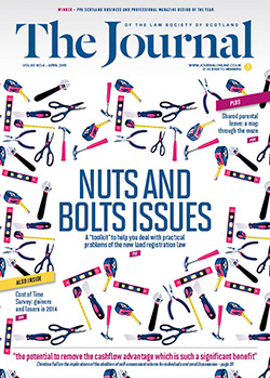Who would be a legislator?

Damned if you don’t consult – but what if you do? How many of us complain that governments pay no attention to the rest of us and that most consultations are mere window dressing? I know I have. But how many of us have been on the receiving end of the public’s views, trying to analyse the feedback? And how many readers of this column even bothered to engage in the consultation process for the Air Weapons and Licensing (Scotland) Bill?
Reading the replies to the consultation has been fascinating. Who said what to the Government – and who said nothing at all? If you have time, read for yourself. Full responses can be found at www.scotland.gov.uk/Publications/2015/01/2961
Fifty two questions were posed in total. Of these, 41 were capable of being answered yes or no, with scope for further comment if desired. Hardly the most onerous of tasks to complete. Yet, in spite of that, there were only 114 responses (113 when you realise that Midlothian Local Licensing Forum was counted twice – not its fault, I am certain), 18 from individuals. The Law Society of Scotland was obviously one of the corporate respondents, but beyond that there were only two contributors from the legal profession, of whom I was one. The next time we gather at a licensing conference to complain about the shortcomings of the legislation, let us all ponder on that.
Making sense of it all
My first sympathy with the Government is in trying to make sense of many of the responses. I’m not making any reference to the green ink brigade, who were, thankfully, thin on the ground. I’m talking here about those who fail to recognise that responses to questions have to be categorised. Many choose to ignore a yes/no option and launch into an essay that leaves the analyst still unclear on the consultee’s view. Mebbes aye, mebbes naw is not helpful (though possibly more so than the couple of examples I noticed of someone answering both yes and no to the same question).
I was interested in the responses on the “fit and proper person” issue. Nearly 90% were in favour of restoration of the “fit and proper” test, but fewer than 60% were in favour of a definition. Of the latter, asked what that test should consist of, many said it should be left up to the lawyers to define. Thanks for that. Even more helpfully, at least two respondents who opposed the return of the test were in favour of it being defined.
I was also interested in responses to the question asking whether licensing boards should have an obligation to promote the licensing objectives. Opinion was split almost evenly on this. Those supporting the idea wanted to make boards more accountable. Those from the health lobby were unanimously in favour. In the opposing camp, many were concerned that it would involve extra expense that would be passed on to the trade.
A significant number of the opponents thought it was unnecessary, as boards’ obligations are already spelled out sufficiently clearly. Many, including many who declined to answer yes or no, felt the question was too vague to allow an unequivocal response. Where there was virtually no divergence of opinion was among the boards themselves. Of those responding, all bar two opposed the proposal. Most stated that they felt it unnecessary, since the objectives were the framework within which all of their board’s work was done. Many felt the concept was too vague and, understandably, were concerned about workload and resources. Of the two boards which ticked the yes box, one was decidedly equivocal.
Couldn’t be bothered?
You will note I used the phrase “of those responding”. This is not a tautology. Astonishingly, out of Scotland’s 32 local authorities, 10 failed to make a return, and there was no group response from the likes of COSLA. If the boards in those areas find themselves landed with ridiculous amounts of unnecessary bureaucracy (annual accounts and returns, justification of their actings on a yearly basis, etc), I am afraid they will get precious little sympathy from me.
Draftsmen are often criticised. How many of us dishing out the criticism play an active part in improving the process?
Postscript
Since this article was filed, the stage 1 report on the Air Weapons and Licensing (Scotland) Bill has been published. To the dismay of many who responded to the consultation, it is clear there will be no changes to the law on site-only provisional licences or surrenders. On the vexed question of transfers, the Scottish Government has told the committee that it “continues to consider the concerns raised”. For further comment, read my blog at www.ormidalels.com
In this issue
- Keeping Government responsible
- Contempt, or good faith?
- Reform – 170 years on
- Employee ownership: adding trust
- The gender gap: coming clean
- Cyber risk - are you covered?
- Reading for pleasure
- Opinion: Graham Sykes
- Book reviews
- Profile
- President's column
- Land Register completion update
- People on the move
- Tools for today's titles
- Those elusive profits
- The Budget and the crystal ball
- Child of our time?
- Elephant in very many rooms
- Video: the best evidence?
- Who would be a legislator?
- Sustainability: applying the presumption
- A woman’s work…
- Scottish Solicitors Discipline Tribunal
- Living the dram
- Land information: a one-stop shop
- From the Brussels office
- Registered paralegals: what trends?
- Law reform roundup
- MHO reports – please help with timing data
- Plaque marks WW1 lawyer dead
- Selling yourself from day one
- View from the grass roots
- Keep it in the family
- Ask Ash
- When cooling-off kicks in
- Bottom line, the accountants are coming
- First day in the office






